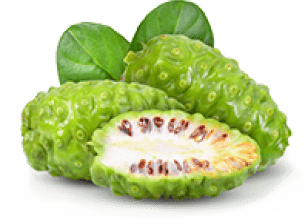Noni Fruit
Noni fruit (Morinda citrifolia L.) is the fruit of an evergreen shrub or small tree native to Southeast Asia and the South Pacific. In China, due to its unique appearance and potential health benefits, it is often referred to as "miracle fruit" or "sea morinda." The fruit's flesh is pale yellow or slightly translucent, with a distinctive odor and taste when ripe. As modern research into the nutritional components and potential health benefits of noni fruit deepens, it has gradually become a highly valued natural ingredient in the functional food industry.

Noni Fruit
1. History and Traditional Uses
Noni fruit has a long history of use in Polynesia, Southeast Asia, and other regions, dating back thousands of years to the seafaring era of the South Pacific, where it was regarded as an important nutritional source by local communities. According to anthropological and ethnobotanical studies, ancient Polynesians often mashed noni fruit into a paste for topical application to soothe skin irritation caused by sun exposure or insect bites. In traditional diets, they fermented, cooked, or consumed ripe noni fruit raw, often to supplement vitamins and minerals lacking in their diets.
In traditional medicinal systems, noni fruit was utilized across various cultures. For example, in Polynesian and Hawaiian folk remedies, noni fruit was considered a key component of daily health maintenance. Additionally, some early records suggest that noni fruit juice was combined with other herbs to promote sweating, maintain physical strength, and alleviate certain discomforts.
2. Usage Methods and Examples
1. Raw or Cooked Consumption
The earliest method of use involved peeling and eating noni fruit raw or cooking it simply to be consumed with staple foods. Due to its distinctive odor, some tribes mixed it with spices or other fruit juices to reduce its pungent or sharp taste.
2. Fermented Products
In traditional Polynesian diets, noni fruit was often sealed in wooden barrels or clay pots for natural fermentation, after which the juice was extracted for drinking. The fermentation process made some nutrients more bioavailable while imparting a unique flavor.
3. Topical and Medicinal Uses
Beyond consumption, local communities historically mashed noni fruit pulp for topical application or mixed it with other plants to create pastes for relieving skin discomfort or joint soreness. While the efficacy of such traditional remedies requires further modern clinical research, their use has been longstanding in folk practices.
3. Modern Processing and Handling Methods
With the rise of the functional food industry, noni fruit processing techniques have become more diverse and refined:
- Cold Pressing/Cold Extraction: Fresh noni fruit is cleaned, peeled, and cold-pressed to extract juice, preserving active compounds, vitamins, and enzymes to the greatest extent.
- Heat Extraction and Concentration: Some manufacturers heat noni fruit before evaporating and concentrating the juice; while this method produces a more stable product, it may lead to the loss of heat-sensitive nutrients.
- Freeze-Drying and Spray-Drying: Commonly used to produce noni fruit powder, capsules, or tablets. Freeze-drying removes moisture at low temperatures to retain nutrients, while spray-drying is more suitable for large-scale production.
- Fermentation Process: Building on traditional methods, modern factories control fermentation conditions scientifically to maintain consistent flavor and enhance the yield of specific active compounds, such as enzymes and polyphenols.
4. Why Noni Fruit is Popular
In recent years, noni fruit has transitioned from a regional traditional ingredient to a globally recognized product, gaining attention for the following reasons:
- Potential Health Benefits: Numerous studies have noted that noni fruit contains polyphenols, flavonoids, and anthraquinones, which may offer antioxidant and immune-modulating effects.
- Consumer Demand for Natural Products: As health awareness grows, more consumers prefer natural fruit and vegetable products free from synthetic chemicals or heavy processing.
- Versatile Applications: Noni fruit can be used to produce juices, powders, capsules, and nutritional supplements, catering to diverse consumption needs.
- Cultural Promotion and Marketing: Historical and cultural promotion of noni fruit in regions like Polynesia and Hawaii has boosted its international recognition.
5. Vitamins and Nutritional Components in Noni Fruit
Modern nutritional analyses show that noni fruit contains a variety of vitamins and nutrients, including:
- Vitamin C (Ascorbic Acid): Supports antioxidant activity and immune function.
- Vitamin B Complex (B1, B2, B3, etc.): Plays a key role in energy metabolism and is essential for nervous system and skin health.
- Minerals: Such as calcium, potassium, magnesium, and iron, which support bone health and various physiological functions.
- Polyphenols and Flavonoids: May possess antioxidant properties, potentially protecting cells from oxidative stress damage.
- Other Phytochemicals: Such as anthraquinones and alkaloids, currently studied for their antibacterial, anti-inflammatory, and immune-supporting effects.
It is important to note that noni fruit is not a "miracle cure." The specific mechanisms of its active components and their long-term safety require further large-scale clinical studies. For individuals with special health needs or chronic conditions, consulting a professional doctor or nutritionist before incorporating noni fruit products into their diet is recommended.
Disclaimer: The content in this article is not medical advice.
